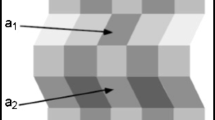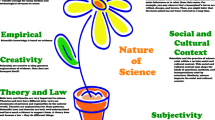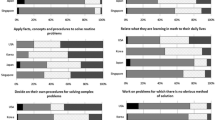Abstract
Before science can be completely understood, one of the fundamental skills that must be developed is observation. Improving descriptive writing and investigating students’ observational skills in the classroom is the purpose of this study. The study was designed to determine if such skills, practiced through modeling activities, serve as a way to improve students’ descriptive directional writing skills. Participating in this study were two groups of seventh (N = 12) and eighth graders (N = 12) at a middle school in the Midwest, USA. The students participating in the study each received a set of materials to construct an item (a 3D object) in an isolated area within the room for privacy. After constructing the item, the student was to write a set of directions on how to construct the item that they had made. A second student was then given the same set of materials along with the first student’s instructions on how to construct it. This activity was repeated four times over a 4-week period. Results indicated that over time students made a significant improvement in their descriptive writing skills and observational skills. Implications of the findings are discussed in terms of the characteristics of middle school students’ skills and knowledge of descriptive writing and observation.
Similar content being viewed by others
References
Allen, T. (2007). Teacher’s toolkit: Methods for success as a middle school science teacher. Science Scope, pp 16–18.
American Association for the Advancement of Science (1989). Science for all Americans. Washington, DC: American Association for the Advancement of Science.
Clements, D. H. (1999). Concrete manipulatives and concrete ideas. Contemporary Issues in Early Childhood Education, 1, 45–54.
Cohen, L., Manion, L. & Morrison, K. (2007). Research methods in education (6th edition). New York, NY: Routledge.
Cox, J. (2006). A unique demonstration model of DNA. Journal of Chemistry Education, 83, 13–19.
D’Amico, J. & Gallaway, K. (2008). Differentiated instruction for the middle school math teacher: Activities and strategies for an inclusive classroom. New York: Wiley.
Gravemeijer, K. E. (1991). An instruction–theoretical reflection on the use of manipulatives. In L. Streefland (Ed.), Realistic mathematics education in primary school (pp. 57–76). Utrecht, The Netherlands: Freudenthal Institute, Utrecht University. p. 59.
Guba, E. G. & Lincoln, Y. S. (1989). Fourth generation evaluation. Newbury Park, CA: Sage.
Haury, D. L. (2002). Fundamental skills in science: Observation. Columbus, OH: ERIC Clearinghouse for Science Mathematics and Environmental Education.
Hickson, J. & Baltimore, M. (1996). Gender related learning style patterns of middle school pupils. School Psychology International, 17, 59–70.
Jablon, P. (2006). Writing through inquiry. Science Scope. pp. 18–20.
Kosso, P. (1992). Reading the book of nature: An introduction to the philosophy of science. Cambridge: Cambridge University Press.
Krontiris-Litowitz, J. (2003). Using manipulatives to improve learning in the undergraduate neurophysiology curriculum. Advances in Physiology Education, 27, 109–119.
Manery, R. (2003). Cosmic oranges: Observation and inquiry through descriptive writing and art. ReadWriteThink, 13. International Reading Association, National Council of Teachers of English.
Merriam, S. (1998). Qualitative research and case study applications in education. San Francisco: Jossey Bass.
National Research Council (1996). National science education standards. Washington, D.C: National Academic Press.
National Research Council (2010). Exploring intersection of science education and 21st century skills—A workshop summary. Washington, DC: The National Academies Press.
Peters, E. (2006). Tried and true: Write it, do it. Science Scope. pp. 11–13.
Sowell, E. J. (1989). Effects of manipulative materials in mathematics instruction. Journal for Research in Mathematics Education, 20, 498–505.
Steele, M. (2005). Science sampler: Teaching science to middle school students with learning problems. Science Scope, pp. 50–51.
Strauss, A. & Corbin, J. (1990). Basics of qualitative research: Grounded theory procedures and techniques. Newbury Park, CA: Sage.
Worsham, S. (2007). Science sampler: You can learn a lot from your dog. Science Scope, 31(3), 6–12.
Author information
Authors and Affiliations
Corresponding author
Appendices
Appendix A. Survey Questions
Pre-survey
-
1.
How would you describe your descriptive directional writing skills in terms of details and sequential information? 1-bad, 2-poor, 3-fair, 4-good, and 5-excellent
-
2.
How would you describe your observational skills through writing?1-bad, 2-poor, 3-fair, 4-good, and 5-excellent
-
3.
What would you describe the greatest strength of your descriptive directional writing skills as?1-bad, 2-poor, 3-fair, 4-good, and 5-excellent
-
4.
What would you describe the greatest strength of your observational skills through writing as?1-bad, 2-poor, 3-fair, 4-good, and 5-excellent
-
5.
How would you rate your need to improve on your observational skills ability?1-bad, 2-poor, 3-fair, 4-good, and 5-excellent
-
6.
How would you rate your need to improve your descriptive directional writing skills ability?1-bad, 2-poor, 3-fair, 4-good, and 5-excellent
Post-survey
-
1.
After participating in the last 4 activities how would you describe your descriptive directional writing skills in terms of details and sequential information?1-bad, 2-poor, 3-fair, 4-good, and 5-excellent
-
2.
After participating in the last 4 activities how would you describe your observational skills through writing?1-bad, 2-poor, 3-fair, 4-good, and 5-excellent
-
3.
If your descriptive directional writing skills have improved through these past 4 activities, how would you describe your improvement?1-bad, 2-poor, 3-fair, 4-good, and 5-excellent
-
4.
If your observational skills have improved through these past 4 activities, how would you describe your improvement?1-bad, 2-poor, 3-fair, 4-good, and 5-excellent
-
5.
Do you think the past 4 activities have improved overall both your observational and descriptive directional writing skills, how would you describe your improvement?1-bad, 2-poor, 3-fair, 4-good, and 5-excellent
Appendix B Rubric
Stays on task | Follows directions | Uses complete sentences, grammar, spelling and punctuation | Uses appropriate descriptive terms | Includes appropriate details for the constructed object | Directions follow a logical and structural sequence |
3-always | 3- always | 3- less than 2 errors | 3- less than 2 errors | 3- less than 2 errors | 3- less than 2 errors |
2- most of the time | 2- most of the time | 2- between 2 and 4 errors | 2- between 2 and 4 errors | 2- between 2 and 4 errors | 2- between 2 and 4 errors |
1- some of the time | 1- some of the time | 1- between 5 and 7 errors | 1- between 5 and 7 errors | 1- between 5 and 7 errors | 1- between 5 and 7 errors |
0- never | 0- never | 0- more than 7 errors | 0- more than 7 errors | 0- more than 7 errors | 0- more than 7 errors |
Project rubric
Student Number_______________________
Activity Number and Date_____________________
Total score out of 18_________________________
Rights and permissions
About this article
Cite this article
Park, DY., Logsdon, C. Effects of Modeling Instruction on Descriptive Writing and Observational Skills in Middle School. Int J of Sci and Math Educ 13, 71–94 (2015). https://doi.org/10.1007/s10763-013-9456-2
Received:
Accepted:
Published:
Issue Date:
DOI: https://doi.org/10.1007/s10763-013-9456-2




